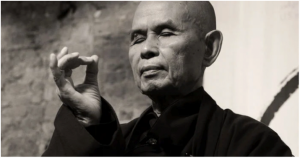
Welcome, dear readers, to another month of taking metta off the meditation cushion and out into the world.
Last month took me on an unexpected Dharmic detour over Waterloo Bridge at sunset in Metta’s Circle of Care. This month found me both climbing the walls and losing my religion—a southern American expression for feeling exasperated—at the Vipassana meditation center where I am still volunteering.
Two months into supporting the kitchen, I caught glimpses of a worrying pattern. At the start of each new 10-day silent course, I would help a new team of kitchen servers learn their roles and routines until I was satisfied that they knew enough to dismantle their scaffolding. However, on return from my days off, I would often be greeted by tensions and tantrums and tales of things going unexpectedly awry.

I put the first few instances down to the inevitable storming phase that most new teams experience, and would jump back in to help everyone cross the course finish-line with as much metta as possible. One cook commented: “The minute you left, it all went boom! You’re the springform that holds this kitchen together.” While their baking analogy made me smile given our surroundings, I don’t pretend to have that kind of power over a group of random strangers. What was really going on when, like Elvis, metta had left the building?

My usual strategy with new kitchen managers was to let them find their own leadership style while also agreeing on a silent signal to let me know when they’d reached overwhelm so we could discreetly find our way outside to discuss what they or the team might need. I would jokingly offer to go back in and play good cop or bad cop as needed, although they usually just needed a metta cop to offer some praise or reassurance or support with a struggling team member.
The springform comment kitchen manager asked to meet privately after Servers’ Metta—an end-of-day sit for servers followed by an operations meeting to plan the next day. I agreed when I saw how visibly upset they were. As we both sipped our teas in the darkened Portakabin that is the servers’ break room during courses, she told me how and why the team had gone so off the rails in my absence. Tears flowed as she told me about being yelled at during the daily briefing meetings, about servers walking out, and—after I’d assured her that she could always take any tricky dynamics to the assistant teachers for support in my absence—she told me about being thrown under the bus during one such interview. A devout Christian, she described it as being crucified on an hourly basis.
I could and couldn’t believe what I was hearing: she’d been nothing but kind, capable, and confident in her role as kitchen manager. She was steady as a rock as a personality, and yet . . . a specific member of the long-term server team, in whom I’d long felt that I brought out the worst, kept coming to mind. Were they perhaps stirring the pot and rubbing salt in wounds in my absence?

Not an easy thing to prove, let alone believe of a fellow meditator and long-term center server. And yet, the timings and patterns started to align in my mind’s eye. We talked until midnight, while I assured her that. none of the storms she had faced in the last few days were hers. Vipassana meditation ideally teaches students to see things as they really are, and that the only thing we can control is our response to sensations. However, a big caveat is not to use those same teachings to gaslight ourselves—sometimes we are being deliberately manipulated or are simply collateral damage in a bigger conflict.
Our conversation in the dark had shed much light on dots that were connecting in my own mind regarding the center’s long-term server team. On arrival in August, it had felt a fun and supportive group; some months and departures later, the passengers (service to self) now outnumbered the participants (service to others). Conversations felt purely transactional, and I often wondered if most of the team had left the building both literally and figuratively. They often described course servers as “fresh meat,” delegating them their tasks whenever they needed a “Zen day,” and warning me not to get too involved in helping courses as I risked burning out! The strangest part for me was them confusing non-attachment with indifference.
Considering centers exist expressly to run courses, their back-to-front logic made me smile as the happiest and healthiest long-term server thanks to actually engaging with and caring about our guests.
Ten years ago, Adam Grant took the business world by surprise with his best-selling book Give & Take: Why Helping Others Drives Our Success (Penguin Books 2014). While I would recommend the whole book to anyone, his advice to givers who have been burned by takers was my biggest takeaway. It’s not a question of switching teams to become a taker yourself, but of changing the direction of your giving.
And so, instead of continuing to feed whatever unpalatable pattern was playing out in the kitchen, I volunteered to help with construction of new long-term server accommodation—maybe me leaving the building for a change would force the others still inside to step up?
My first day on the freezing building site warmed my heart when I was shown the same kindness and patience trimming and securing insulation by the contractor as I had shown dozens of new arrivals in the kitchen previously with catering equipment.
We worked every daylight hour possible, exchanging life and meditation stories, munching on chocolate, and laughing at my often clumsy and comical learning curve. It was truly humbling to redirect my giving being taken for granted by takers indoors to a fellow giver outdoors—someone who had quietly done more for the center since it had opened than the entire current long-term server team combined. He told me about all the different houses he had helped build over the years for others, and how people often misperceived carpentry as securing things when it really was more a question of adjusting, adjusting, adjusting as you went. Well, that lit up this metta meditator secretly wondering what she was still doing somewhere that really didn’t sit right anymore.
One of my favorite memories of helping the build was climbing onto the roof one morning to survey which surrounding trees needed trimming back, only to be amazed at how much I remembered from volunteering in a woodland two years earlier and gaining an unexpected fresh perspective on my increasingly claustrophobic surroundings. That, and gingerly learning to balance on daily makeshift scaffolding of planks and ladders and, once in a while, hearing a gentle reminder that one more step would be onto nothing but fresh air!
When I nipped into the kitchen one morning to fill our flasks with hot drinks, I stumbled on the latest kitchen manager in floods of tears! I quickly bundled her outside to give her some privacy, and out poured story after story of more than just the inevitable tumble-polish of a Vipassana kitchen team. The crux of her upset was best summed up by one line: “We’re just a conveyor belt of monkeys to them!”
From what I had been witnessing lately, she wasn’t wrong. And even more worryingly, she was later invited to an interview with the assistant teacher where she—rather than the center servers—was lectured on the language of compassion.
When I broached some of what she shared at the next long-term server meeting held in the Dhamma Hall, various members—some of whom had never even met her!—diagnosed her with various mental illnesses. And when I described having to provide pastoral care to several course servers despite working construction, I was shut down for asking everyone to please be more present during courses. Course history was magically rewritten.
Until then, I could still feel compassion for the reluctance of my team of relatively new meditators to wade into the deep end at times, but deliberately breaking sila around the Dhamma seat in their favor was a step too far. In that moment, I inwardly stepped off the scaffolding of Vipassana and onto nothing but fresh air after 15 years of dedicated sitting and serving. I felt well and truly done with its courses, centers, and organization. Paradoxically, I had found less resistance serving the Dhamma and generating metta in the outside world than on Pure Land!

The following day, one of the center’s two site assistant teachers visited. They requested a private interview and, as we sat alone in the Dhamma Hall, out poured the good, the bad, and the ugly of my last four months, and of reaching my absolute limit with the “the center is always right” line.
Once I’d spoken what I hoped was everyone’s piece, I thanked them for listening when not many would, and then walked away. Whether or not any adjustments for the benefit of future servers will come of that conversation held in the light, I like to think it restored some balance to the ugly and untrue things said the night before.
And so, dear readers, in this upcoming season of giving, please remember to step off any outdated inner scaffolding where your metta may either be being taken for granted or exploited, and adjust, adjust, adjust until your own center always feels right.
Or, to metta-morphose REM’s song “Losing My Religion”:
Oh life is bigger
It’s bigger than you
And you are not me
The lengths that I will go to
The distance in your eyesOh no I’ve said too much
I set it upThat’s me in the corner
That’s me in the spot-light
Losing my religion
Trying to keep up with you
And I don’t know if I can do it
Oh no I’ve said too much
I haven’t said enoughI thought that I heard metta laughing
I thought that I heard metta sing
I think I thought I saw metta try
See more
Adam Grant: are you a giver or a taker? (YouTube)
Related features from BDG
The Life and Teachings of Christmas Humphreys, Founder of the London Buddhist Society
From Traditional Roots to Modern Mindfulness: The Movement of Vipassana Meditation in the 20th Century
Five Things I’ve Learned About Compassionate Action
Commemorating the Centenary of the Birth of Vipassana Meditation Master Munindraji
Nurturing the Roots of the Thai Forest Lineage in Britain: A Short Conversation with Ajahn Sucitto














